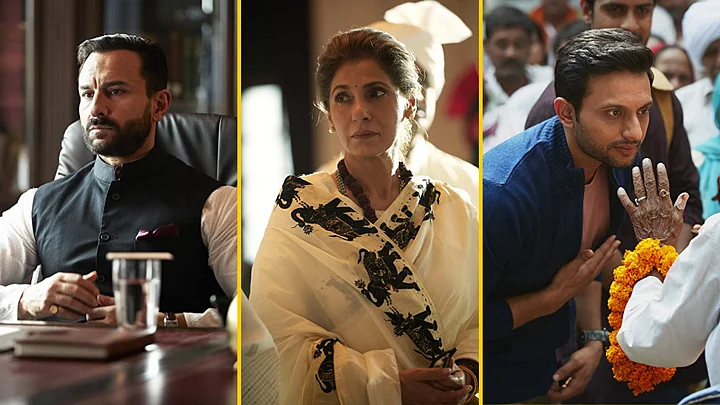“The scenarios are more facile than they appear in the trailer": This should have been the caveat at the beginning of Tandav. I had watched the first five episodes in quick succession and though the narrative was nowhere as compelling as one would expect, one had still hoped that the series would somehow redeem itself in the end. But alas that wasn’t to be. In fact, if anything, one has come out of it feeling rather short-changed given that the proceedings were so vacuous .
A politically charged atmosphere greets us from the opening frame itself. A kisan (farmer) rally underway, election results eagerly awaited; the violence deeply embedded and implicit as individual ambitions and greed take over. Tandav, created and directed by Ali Abbas Zafar, thrusts us headlong into this all-pervasive, slow burn political drama. Samar Pratam Singh (Saif Ali Khan) is the heir apparent to his politician father’s legacy.
While a lot is packed into the first five episodes, the familiarity of the arc and predictability in the storytelling eventually ensure that the pleasures slowly dwindle. And it never picks up. Slo-mo shots of Samar and his clan cat walking down the power corridors to rousing music with a plastered smile doesn’t help matters.
Samar looks like a guy always hatching a menacing plan in his head but there is little concrete success given that the writing is so startlingly unexceptional. And one can see the big twist from miles away—it’s just a case of much ado about nothing. Anuradha Thakur, a close associate of Samar’s father and senior party worker enthrals us with her on screen presence.
It’s tough to tear oneself away when Dimple Kapadia comes on screen. Much of the power she wields is not explicitly spelt out or spoken of but which we feel nevertheless thanks to her brilliant command over her character. Matching her energy is Mohd Zeeshan Ayyub, playing the charismatic student leader precariously poised to take on political heavyweights.
Each time they are in frame they lure us in and Tandav grips. But this happens sporadically and soon enough they are relegated to the margins never allowed to showcase their full potential. In fact, by the end of episode 2, the whole “rajneeti” and “chanakyaneeti” metaphor to manoeuvre along the beaten track simply ticks the checklist we have when settling in for a political drama.
Although it’s interesting to see how Gaurav Solanki‘s writing draws from reality. The kisan rally to Azadi (freedom) chants in the “VNU university”, close assessment of student elections and police brutality, the threat of authoritarianism and murky deals struck is commendable but sometimes overstating the case simply leaves the story enervated .
Also, some casting choices are suspect. Sarah Jane Dias, Shonali Nagrani with their single tone expressions and not a hair out of place looks stick out like sore thumbs and Ali Abbas Zafar’s perfectly created world seems too polished for the raw, ravenous power-hungry games that are being played out.
There is a strong hint that a season 2 would be coming our way soon. But after watching all nine episodes, I have to admit we are none the wiser and the show for all it’s grandstanding offers nothing new or compelling. Had I not bothered watching the last four episodes I could have saved on some precious time. Stubbornly average.
